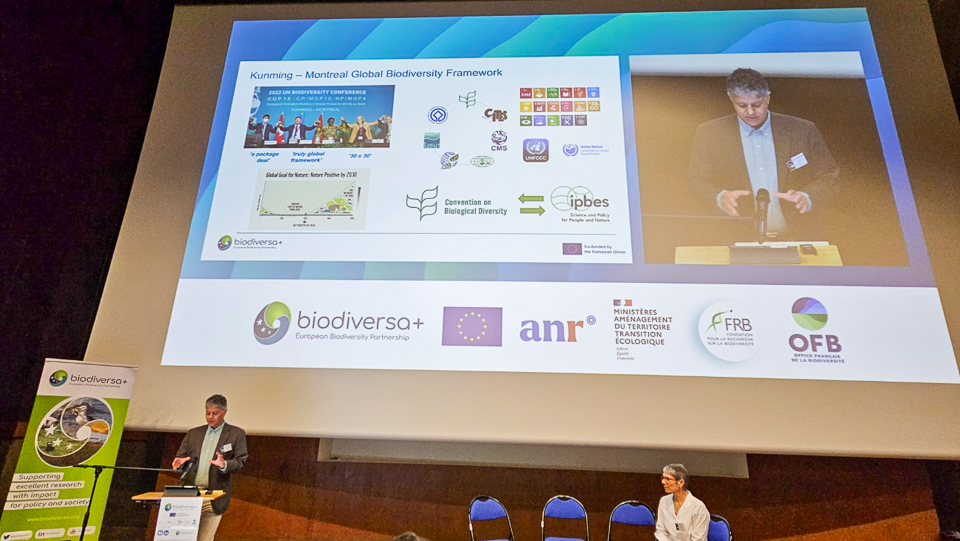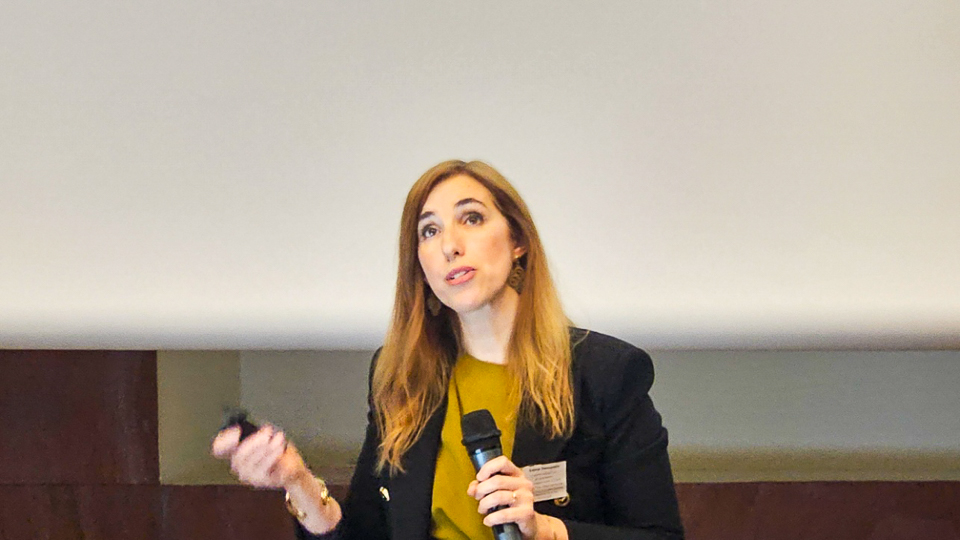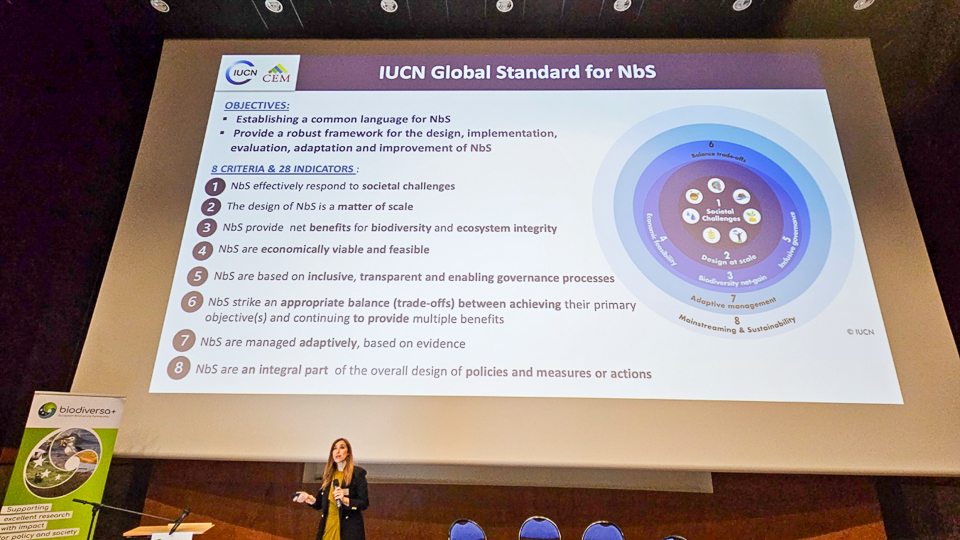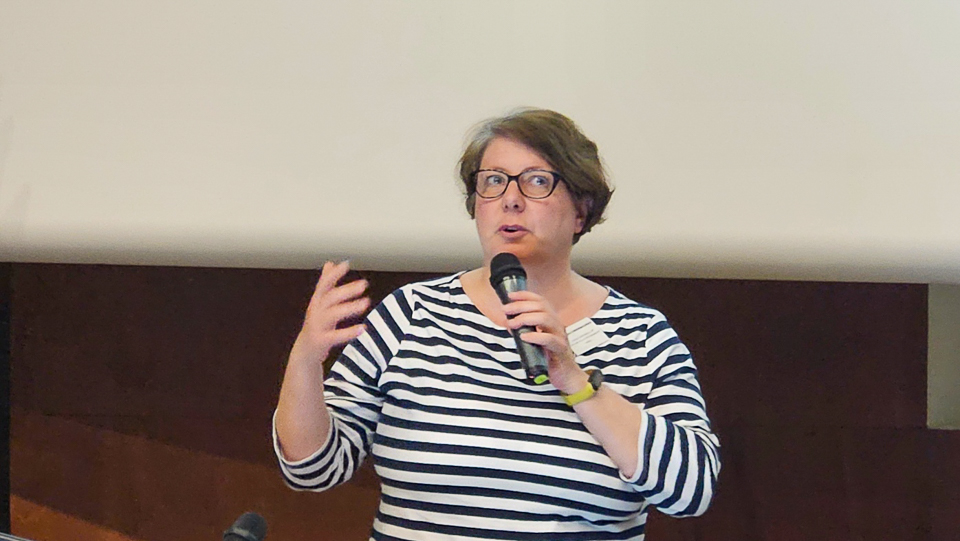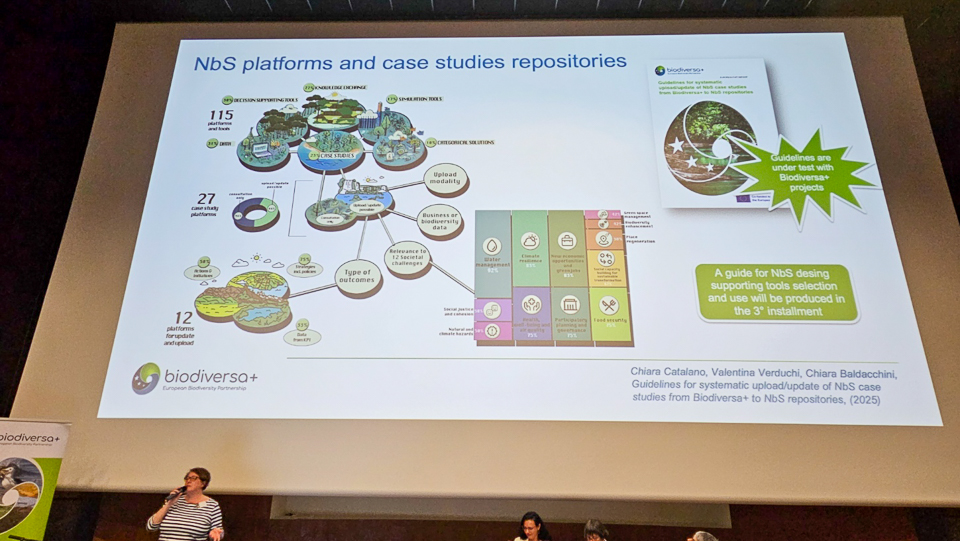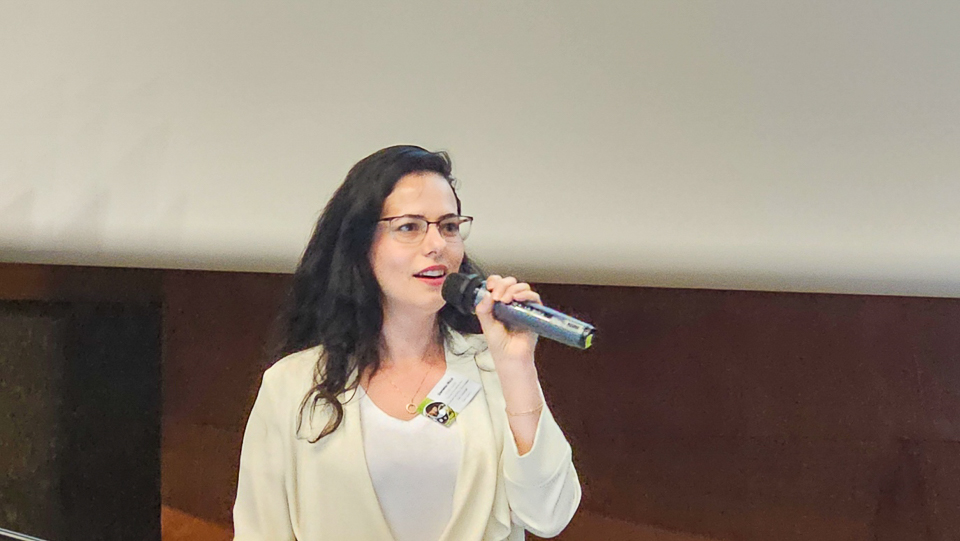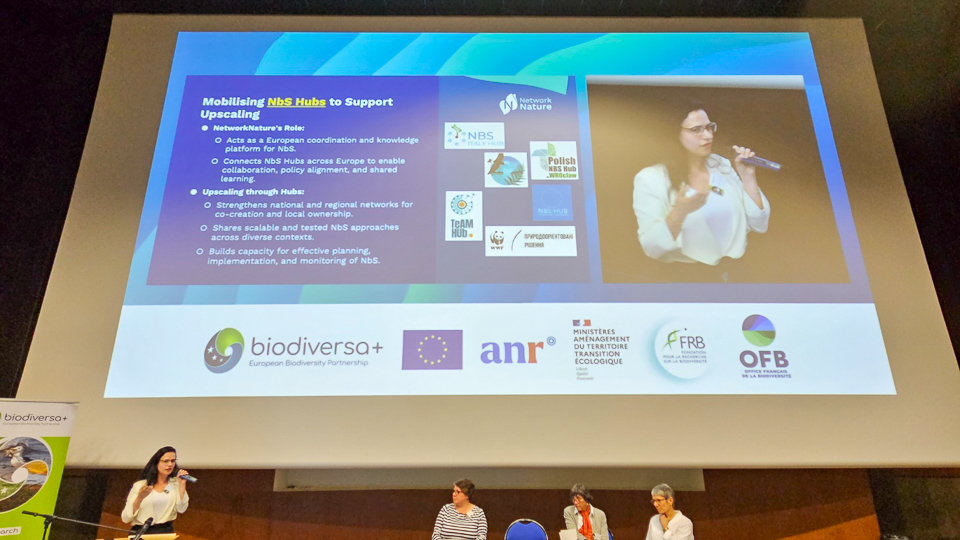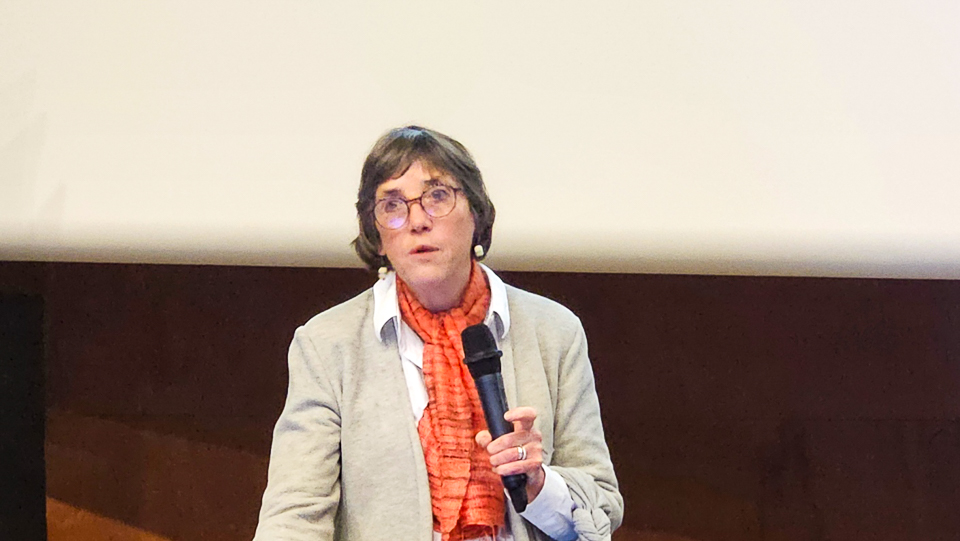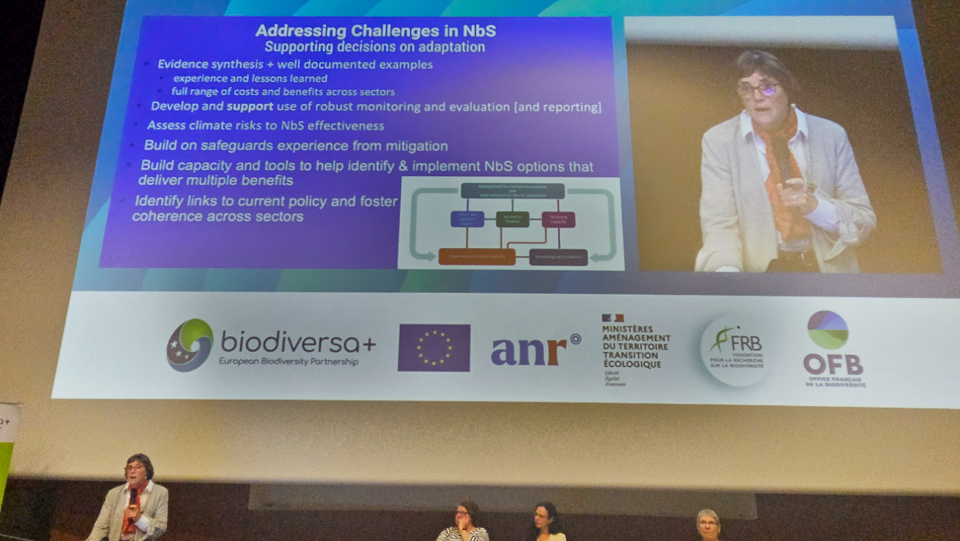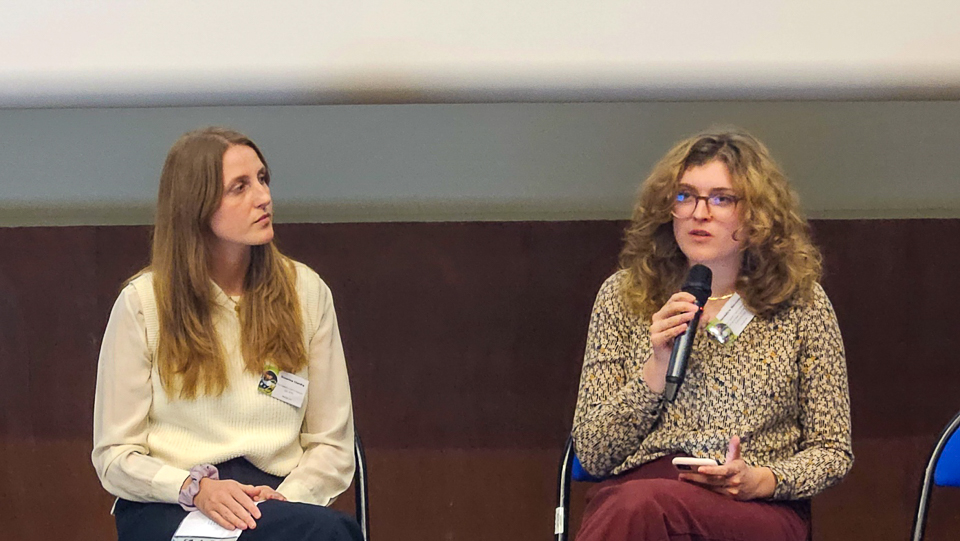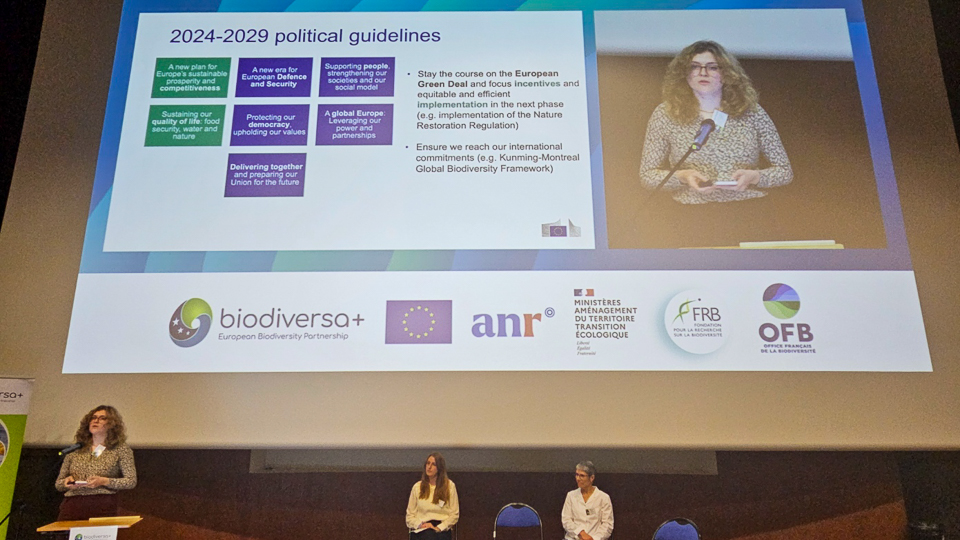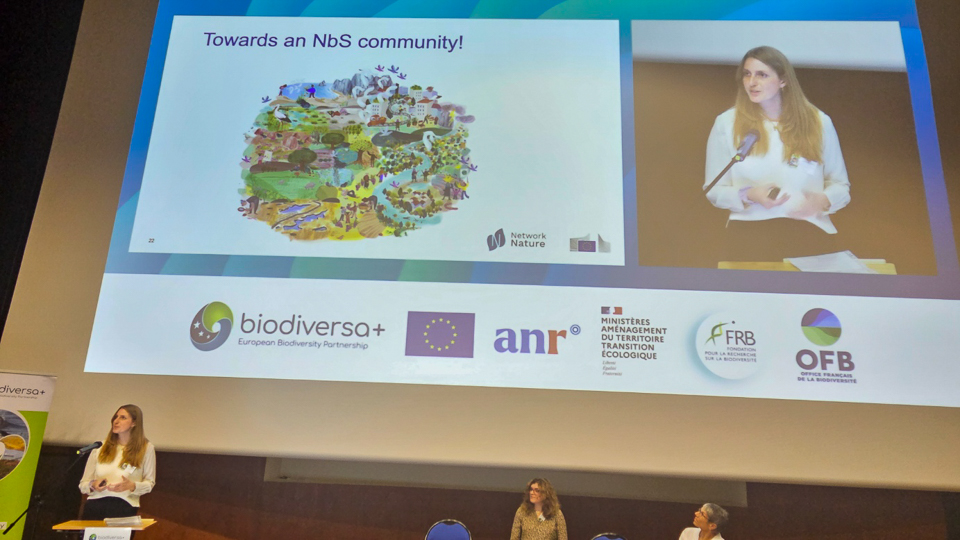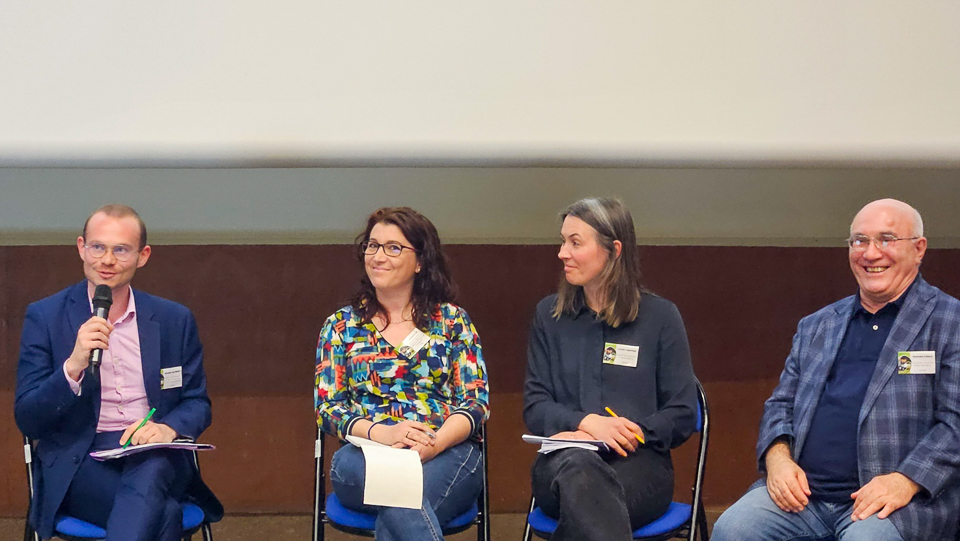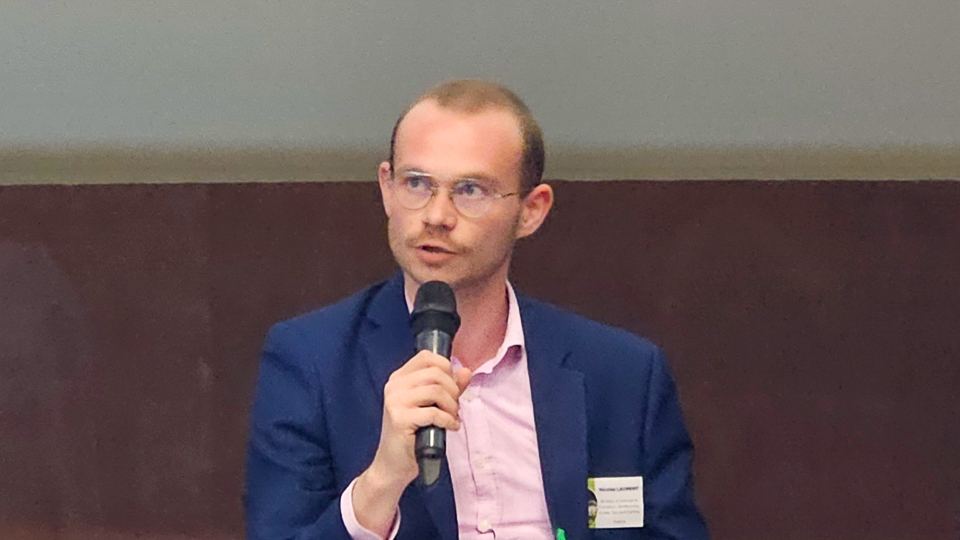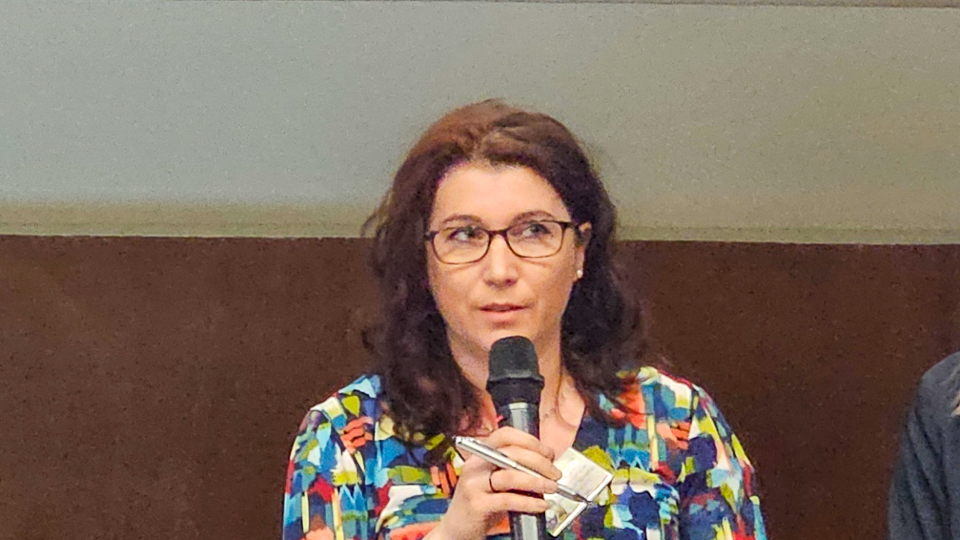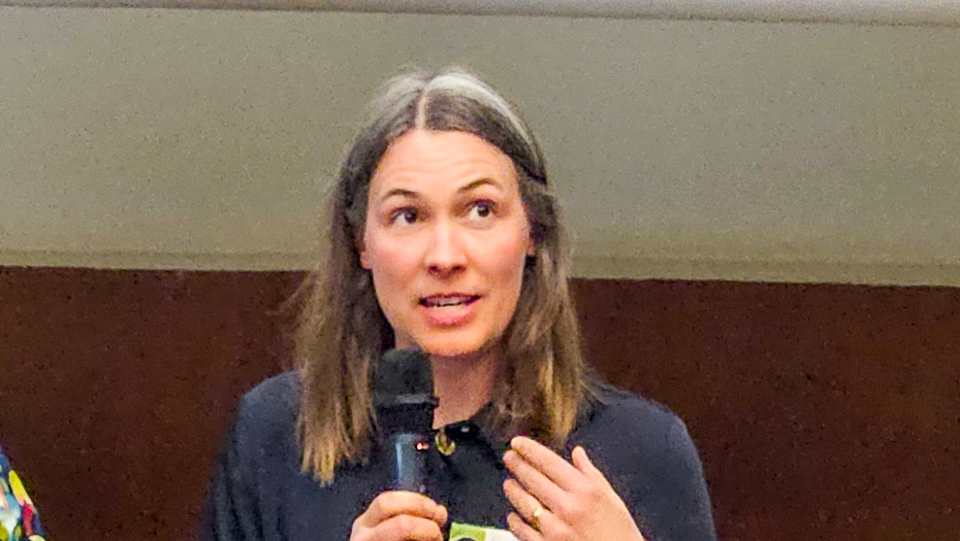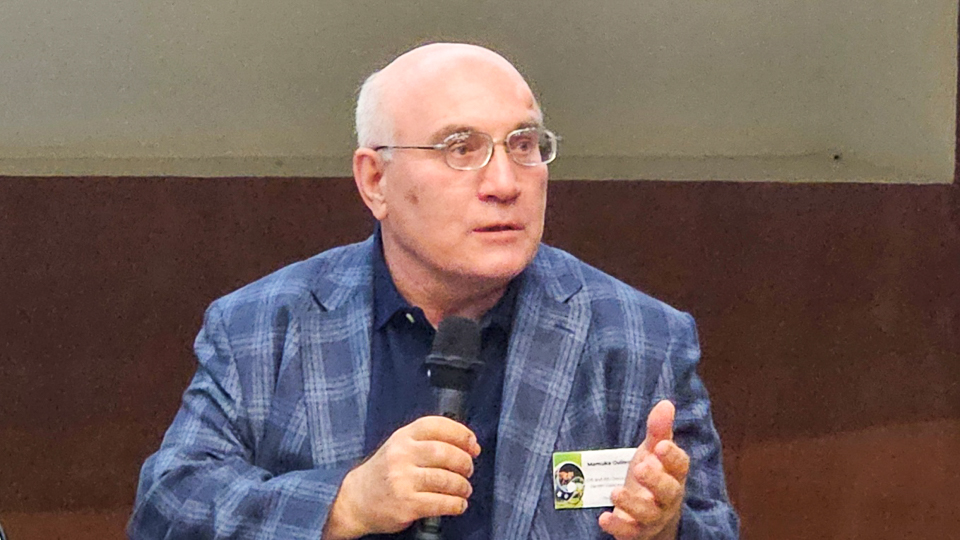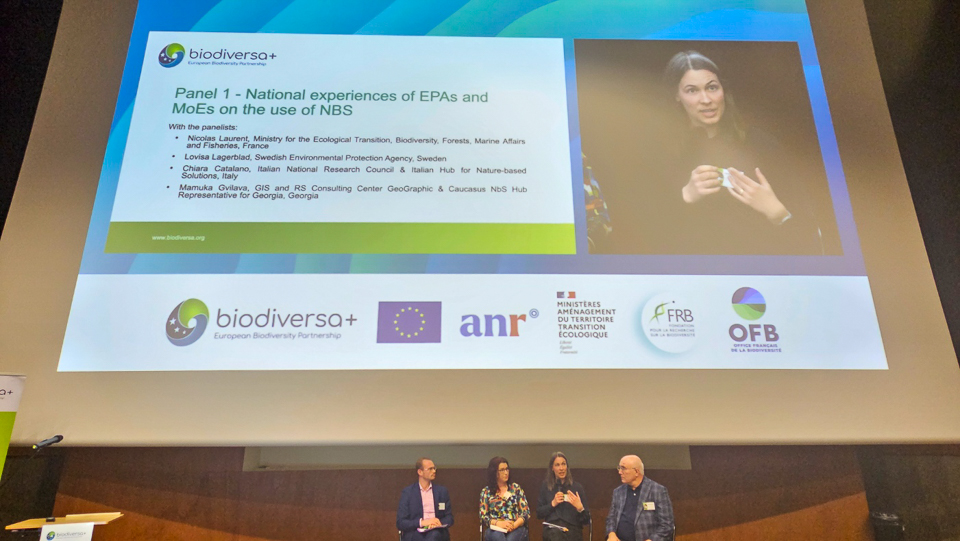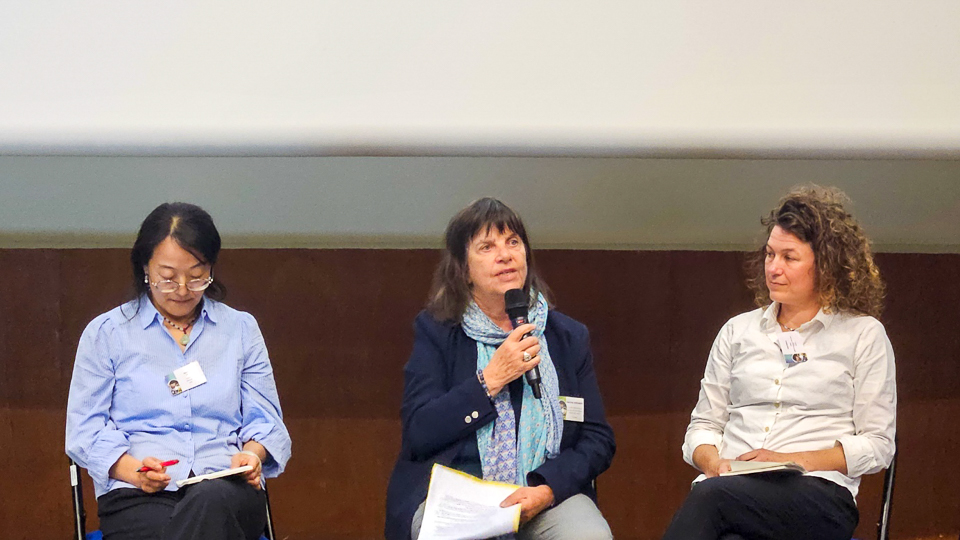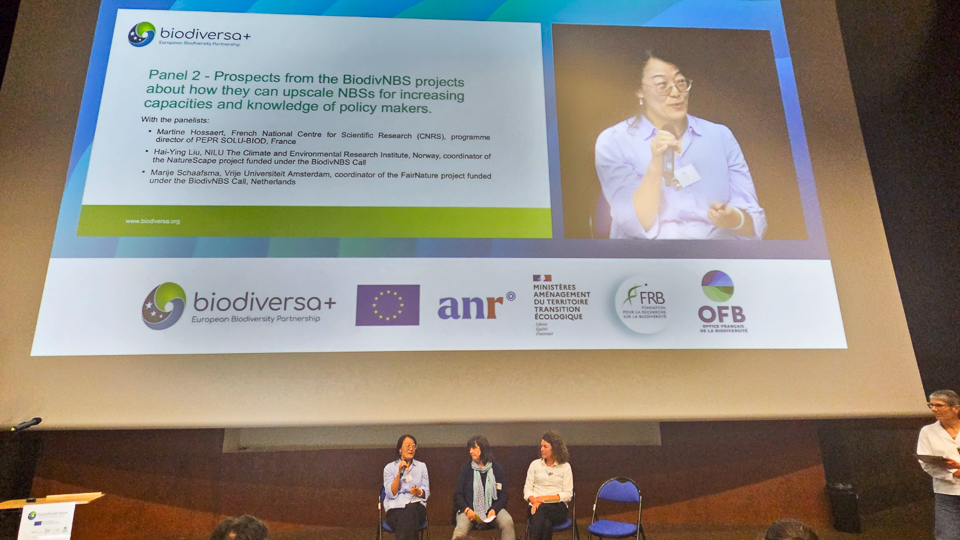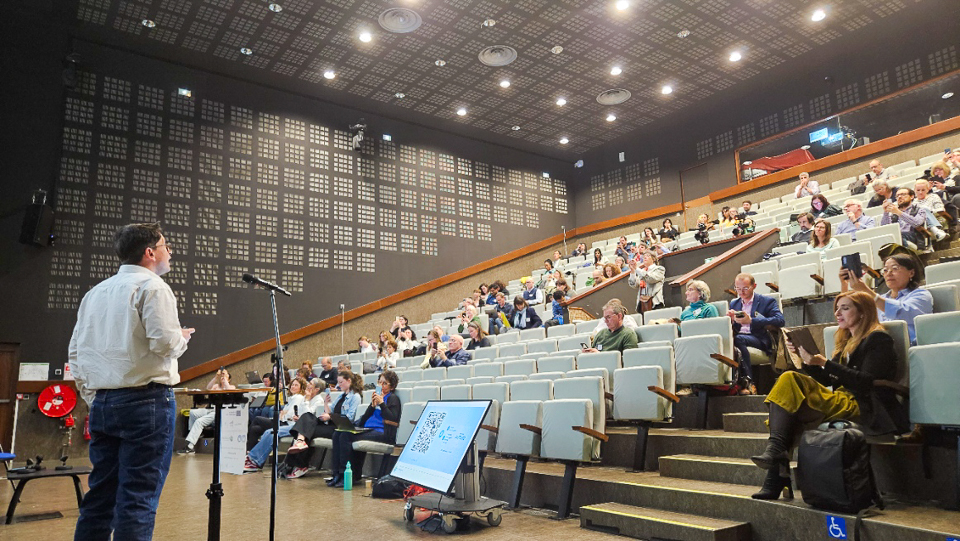On 8 April 2025, the Biodiversa+ Science Policy Forum took place in Montpellier and online, bringing together researchers, policymakers, and practitioners from across Europe and beyond. The event focused on building capacity to mobilise Nature-based Solutions (NbS) in support of the Global Biodiversity Framework (GBF), and explored how to better connect science, policy, and practice to scale up NbS implementation effectively.
Challenges & priority actions
Discussions highlighted that while policy momentum around NbS continues to grow, significant barriers continue to hinder their widespread adoption:
- One major challenge is the limited general awareness among both stakeholders and the public. This challenge is closely tied to the ongoing difficulty of assessing how effective NbS truly are in the long run. Because NbS tend to be tailored to specific sites, it’s hard to capture their broader impact or compare them consistently to more conventional approaches. The absence of strong, long-term socio-ecological monitoring systems adds to the problem, making it difficult to build a reliable evidence base.
- Practical limitations were another key issue. Many organisations and authorities still lack the capacity—whether in terms of time, expertise, or resources—to fully engage with or implement NbS. Financial hurdles remain a major sticking point, especially as there’s still no widely accepted way to measure the economic value of these solutions. This makes it harder to bring in private investors, even though businesses are becoming more aware of the risks tied to biodiversity loss and ecosystem degradation.
- Regulatory and policy fragmentation adds yet another layer of difficulty. Efforts made at the international or EU level don’t always filter down effectively to local contexts, where action actually needs to take place. Participants noted that translating these high-level strategies into grounded, practical measures remains a significant challenge.
- Participants also raised concerns about the potential for unintended social consequences. For instance, well-meaning interventions can sometimes lead to gentrification or disrupting existing community dynamics. These examples highlight the importance of considering environmental and social justice from the start, not as afterthoughts. The lack of collaboration across disciplines—especially the limited involvement of engineers and other technical experts—was also flagged as a barrier to more holistic and effective strategies.
To address these challenges, the forum outlined a set of priority actions:
- Establishing integration: One key step is embedding NbS into national policy frameworks, as exemplified by France’s incorporation of NbS into its national adaptation and biodiversity plans. This not only provides clear strategic direction and legitimacy but also highlights the need to break down the traditional barriers between sectors. When government departments working on water, food, energy, climate, and health start collaborating closely, and when researchers, local communities, businesses, and technical professionals like engineers come together, the potential for effective NbS increases substantially.
- Building knowledge and capacity: The development of accessible tools and platforms—exemplified by NetworkNature’s role as a comprehensive resource hub—is essential to bridging critical gaps in our current understanding. More targeted research is needed, especially when it comes to long-term socio-ecological monitoring, which would help reveal not only the benefits but also the adaptive potential of NbS over time. This requires drawing on interdisciplinary expertise and ensuring that voices from the Global South are part of the conversation, fostering a two-way exchange of knowledge.
- Ensuring viability: This requires strengthening monitoring and evaluation frameworks to assess ecosystem services and socio-ecological outcomes comprehensively. Developing harmonised valuation metrics to quantify economic benefits remains a high priority, as these measurements are crucial for attracting private investment and building broader confidence in NbS. Rigorous, evidence-based approaches will ultimately boost trust among decision makers and the public alike.
- Fostering engagement: Communicating the benefits of NbS in ways that resonate with broader policy goals—such as boosting economic competitiveness—can help attract wider support. Locally, involving communities and stakeholders in the design of solutions ensures that interventions are tailored to specific contexts and genuinely meet local needs. Along with these efforts, embedding principles of equity and justice into every stage of implementation will help avoid unintended outcomes like gentrification and ensure that NbS truly provide inclusive benefits.
The forum concluded with a clear call to action: the time has come to bridge the gap between frameworks, knowledge, and practice. Advancing NbS at scale will require more than technical solutions; it demands coordinated action, sustained collaboration, and a shared commitment to transformative change.
Outline of key interventions
- In the opening, François Pierrot, Anne-Hélène Prieur-Richard, and Magnus Tannerfeldt underscored the urgency of NbS in tackling interconnected environmental and health crises, the European dimension of collective action, and the forum’s aim to bridge science, policy, and practice for NbS uptake across various sectors.
- Edna Cabecinha (IUCN) provided a comprehensive overview of the IUCN Global Standard for NbS, positioning it as a vital operational framework with 8 criteria and 28 indicators for designing, implementing, and assessing effective NbS aligned with the GBF. The standard is intended for a wide range of stakeholders, including the private sector and policymakers.
- Chiara Baldacchini (Biodiversa+) detailed Biodiversa+’s efforts in promoting NbS. These efforts include mapping the European landscape on NbS research and innovation (R&I) and on business and biodiversity, with guides soon to be released. She also highlighted the collaboration with NetworkNature on the European roadmap to 2030 for R&I on NbS and on knowledge gaps and EU research initiatives databases.
- Daniela Rizzi (NetworkNature) presented NetworkNature’s role as a central hub for EU-funded NbS projects, aiming to consolidate resources, guidance, and tools. She emphasised the importance of NbS Hubs at national and regional levels for knowledge exchange, stakeholder engagement, and informing national restoration plans in line with the EU Nature Restoration Regulation.
- Valerie Kapos (UNEP-WCMC) focused on the role of ecosystem restoration for climate change adaptation, stressing the need for evidence-based NbS that complement traditional solutions and highlighted the importance of knowledge exchange with the Global South.
- The Q&A sessions addressed various issues such as the alignment of NbS frameworks with ISO standards and the GBF, the inclusion of social justice considerations, and the need for broader engagement with engineers and architects.
- Bénédicte Blaudeau (DG ENV) outlined the integration of NbS within EU policy priorities, including the European Green Deal, the EU Biodiversity Strategy for 2030, and the legally binding Nature Restoration Regulation, alongside initiatives like the New European Bauhaus and the LIFE Programme.
- Susanna Gionfra (DG RTD) detailed the significant EU support for NbS research and innovation through Horizon Europe and other programs, highlighting funded projects and the role of NetworkNature in building the NbS community.
- In the first panel discussion, national representatives shared their experiences integrating NbS into national policymaking. Nicolas Laurent (French Ministry of the Environment), Lovisa Lagerblad (Swedish Environmental Protection Agency), Chiara Catalano (Italian NbS hub), and Mamuka Gvilava (Caucasus NbS hub) highlighted a range of challenges, including financial analysis, community engagement, knowledge transfer, and ensuring policy coherence. The discussion also underscored the need for simplified tools to support wider adoption, the importance of addressing knowledge gaps—particularly around long-term impacts—and the necessity of robust monitoring and evaluation frameworks. Panellists further emphasised the need for strong, compelling narratives that link NbS to broader policy priorities.
- The second panel discussion gathered research project representatives. Martine Hossaert (SOLU-BIOD), Hai-Ying Liu (NatureScape), Marije Schaafsma (FairNature) focused on upscaling NbS for policymakers, addressing barriers in translating research into policy. They highlighted the importance of integrating environmental and social justice into NbS projects, along with the need to develop tools to assess these dimensions. Key strategies identified included multi-actor approaches, co-developing governance models, and leveraging citizen science to foster inclusive and effective implementation.
- In closing the Forum, Osman Tikansak (Biodiversa+) stressed the strong existing foundations and the need to connect frameworks, knowledge, and policy. He urged continued collaboration, equity, and evidence-based action to implement NbS as essential solutions for a sustainable future, leveraging tools like the IUCN Global Standard and initiatives like NetworkNature.
We warmly thank all speakers and participants for their contributions to the Forum, as well as our hosts and French partners—ANR, OFB, FRB, MTE_FR, and the University of Montpellier—for their generous support. Let’s keep the momentum going and turn these conversations into lasting action for Nature-based Solutions!
How can we effectively mobilise Nature-based Solutions (NbS) to achieve the Global Biodiversity Framework (GBF)? Join our Science-Policy Forum on 8 April 2025, from 13:00 to 17:00 CEST to explore this issue.
We’ll delve into:
- European NbS initiatives and national implementation strategies
- Institutional support for governments on ecosystem-based adaptation
- EU policy support for scaling up NbS (policy, research, capacity building)
- Practical experiences and future prospects through expert panel discussions
This forum is strategically timed before the BiodivNBS kick-off meeting (9 April), providing a valuable bridge between policy and the latest European research and innovation in NbS.
13:00 – 13:15 Opening & welcome words, by Sybille van den Hove (moderator), François Pierrot (Vice president for international Affairs, University of Montpellier, France), Anne-Hélène Prieur-Richard (Head of the Department “Environment, Ecosystem, Biological Resources”, ANR, France), & Magnus Tannerfeldt (co-chair of Biodiversa+, FORMAS, Sweden)
13:15 – 13:35 The IUCN Global Standard for NbS: A key tool for scaling up biodiversity action, by Edna Cabecinha (Co-lead Nature-based Solutions Thematic group, IUCN)
13:35 – 13:50 Biodiversa+’s support for the promotion of NbS in member states, by Chiara Baldacchini (Biodiversa+ Work Package leader on “Nature-based Solutions, Biodiversity & Business”, MUR, Italy)
13:50 – 14:05 NetworkNature: Mobilising NbS hubs for upscaling NbS and supporting National Restoration Plans, by Daniela Rizzi (NetworkNature Project Manager, ICLEI Europe)
14:05 – 14:20 Restoring ecosystems for adaptation: Supporting NbS planning and decision-making from project to national scales, by Valerie Kapos (Principal Specialist Nature-based Solutions, UNEP-WCMC)
14:20 – 14:35 Q&A
14:35 – 15:00 Break
15:00 – 15:20 How does the EU support the scaling up of NbS through policies, research and capacity building?, by Susanna Gionfra (Policy Officer Biodiversity & Nature-based Solutions, DG Research & Innovation, European Commission) & Bénédicte Blaudeau (Policy Officer, DG Environment, European Commission)
15:20 – 16:05 Panel Discussion (Session 1) | Experiences of Environmental Protection Agencies (EPAs) and Ministries of Environment (MoEs) on the use of NbS, with Nicolas Laurent (Ministry for the Ecological Transition, Biodiversity, Forests, Marine Affairs and Fisheries, France), Lovisa Lagerblad (Swedish Environmental Protection Agency, Sweden), Chiara Catalano (Italian National Research Council & Italian Hub for Nature-based Solutions, Italy), Mamuka Gvilava (GIS and RS Consulting Center GeoGraphic & Caucasus NbS Hub Representative for Georgia, Georgia)
15:05 – 16:50 Panel Discussion (Session 2) | Prospects from the BiodivNBS projects about how they can upscale NbS for increasing capacities and knowledge of policy makers, with Martine Hossaert (French National Centre for Scientific Research, programme director of PEPR SOLU-BIOD, France), Hai-Ying Liu (NILU The Climate and Environmental Research Institute, coordinator of the NatureScape project funded under the BiodivNBS Call, Norway), Marije Schaafsma (Vrije Universiteit Amsterdam, coordinator of the FairNature project funded under the BiodivNBS Call, Netherlands)
16:50 – 17:00 Concluding words, by Osman Tikansak (FORMAS, Sweden)
